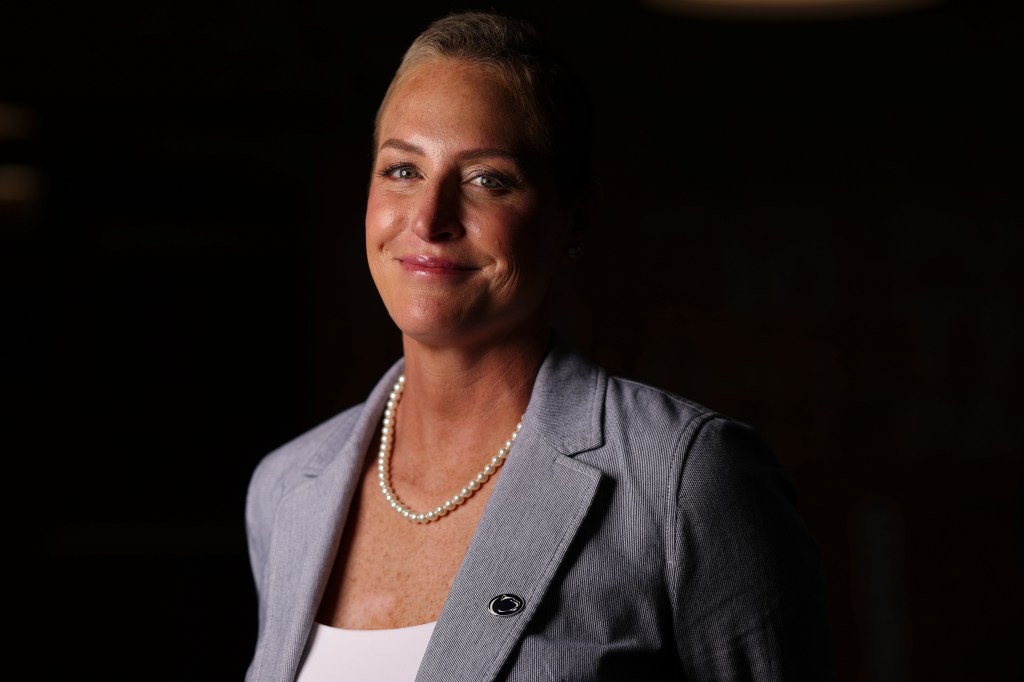Katie Schumacher-Cawley was in the middle of a busy slate of media engagements at the Big Ten Network studios in Chicago in late July when she was asked about the journey that has pushed her into the national spotlight.
After all she has been through in the last year, the reporter wondered at Big Ten volleyball media days, what is different for Schumacher-Cawley as she heads into her fourth season as the Penn State coach?
“I have a new hairdo this year,” the coach joked of her short brown hair.
The Chicago native and former Mother McAuley state champ has a different perspective too. How could she not?
In September 2024, not long after the Nittany Lions opened their season, Schumacher-Cawley was diagnosed with breast cancer, beginning a medical ordeal that included six rounds of chemotherapy in the fall and winter, a double mastectomy in March, 15 rounds of radiation that ended in May and continued maintenance chemotherapy.
In December, in the middle of treatments, she led Penn State to the national championship, becoming the first female coach to win an NCAA Division I women’s volleyball title. Her story was featured last month on the ESPYs when she was given the Jimmy V Award for Perseverance.
Schumacher-Cawley worked to exhaustion to make sure not much changed in the gym for her team throughout her fight, with the help of her coaching staff, and she said she maintains the same high standards, the same accountability heading into the 2025 season.
But she also hopes her players can see life through the altered lens that comes with taking on an opponent like cancer.
“Life is so short and so precious — I don’t take the little things for granted,” Schumacher-Cawley, 45, told the Tribune. “I hope that’s something the players can start to do … really just sit back and be present and enjoy the people around you.”
An exhausting juggle
Penn State was trailing Nebraska 2-0 in the national semifinal in Louisville when Schumacher-Cawley delivered a similar message to national freshman of the year Izzy Starck.
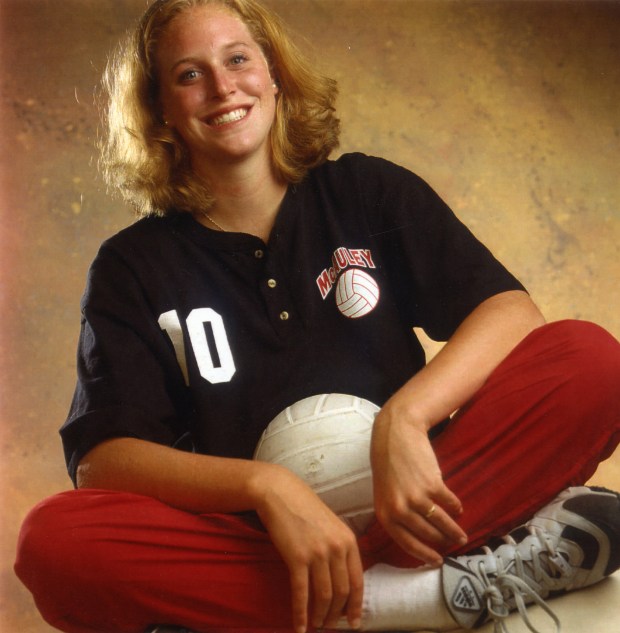 Mother McAuley volleyball standout Katie Schumacher on Aug. 20, 1996. (Bob Fila/Chicago Tribune)
Mother McAuley volleyball standout Katie Schumacher on Aug. 20, 1996. (Bob Fila/Chicago Tribune)
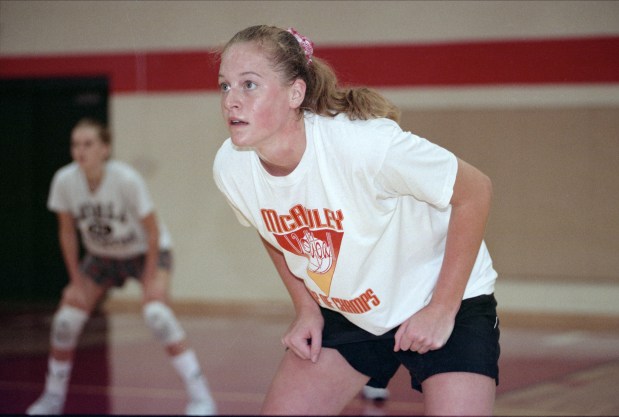 Mother McAuley volleyball player Katie Schumacher waits for a serve Sept. 9, 1994. (John Kringas/Chicago Tribune)
Mother McAuley volleyball player Katie Schumacher waits for a serve Sept. 9, 1994. (John Kringas/Chicago Tribune)
Starck was stressed out, as any player might be staring down elimination before reaching the ultimate goal, but her coach offered calming words.
“Just relax and enjoy the moment and enjoy what’s happening right now,” Starck recalled Schumacher-Cawley saying. Penn State rallied to win the next three sets and advance to the title match.
For Schumacher-Cawley, the gym was her refuge over the last year, a place where she could feel free of the weight of her illness as she guided her team through practices and matches.
Penn State players were all in the film room during a September practice when Schumacher-Cawley delivered the news of her diagnosis. The players froze, filled with sadness, uncertainty and worry for their coach, libero Gillian Grimes said.
Schumacher-Cawley tried to answer any questions they had, but she also instructed them that it would be “business as usual” — whether she had found the proper mindset for the challenge ahead or not.
“I don’t know if you really do, but it was just I was in the season and we had to go,” Schumacher-Cawley said. “We had to continue life as normal. I think I did my best to do that.”
The weeks ahead naturally were exhausting. Mentally, she struggled with the uncertainty of what was happening to her body. Physically, Schumacher-Cawley was determined to find the energy to juggle treatments and practices and matches.
Her mother, Cathy Schumacher, moved from her home in Chicago’s Morgan Park/Beverly neighborhood to stay with the family and help care for their three daughters. The coach and her husband, Mike Cawley, would travel to Philadelphia late the night before her chemotherapy treatments, go to early appointments and then make it back to State College that afternoon, Cathy said.
Schumacher-Cawley didn’t want to miss anything with her team. In fact, it made her feel better to be with them.
“There were some days I was just so exhausted,” Schumacher-Cawley said. “But I think the adrenaline and fire — how the team was, just high energy — you couldn’t be not feeling great around them. They helped me more than they know.”
Cathy, whose husband died of prostate cancer when he was 62 years old, remembers the All-American banquet in Louisville. The Nittany Lions had played the semifinal match until after midnight. The next day, Schumacher-Cawley returned after an hour at the banquet and had to lie down to rest, though she tried not to let anyone know, Cathy said.
“Toward the end, she would get pretty sick, but she would never show it, that’s for sure,” Cathy said.
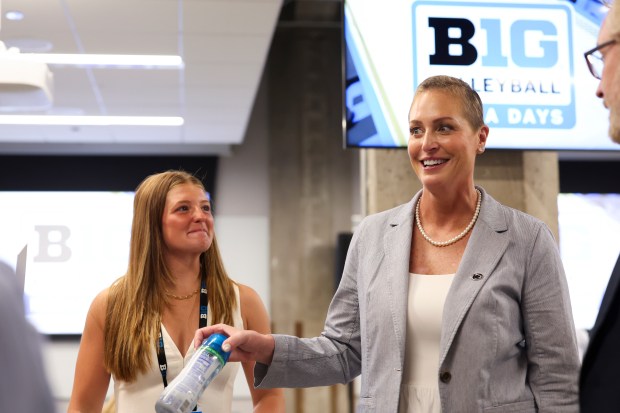 Penn State volleyball player Gillian Grimes, left, stands with coach Katie Schumacher-Cawley as they chat with members of the media during Big Ten volleyball media days in the Big Ten Network studios on July 28, 2025, in River North. (Eileen T. Meslar/Chicago Tribune)
Penn State volleyball player Gillian Grimes, left, stands with coach Katie Schumacher-Cawley as they chat with members of the media during Big Ten volleyball media days in the Big Ten Network studios on July 28, 2025, in River North. (Eileen T. Meslar/Chicago Tribune)
Grimes said Schumacher-Cawley was “her true self every single day,” so it was easy to forget the battle the coach was waging. The cap she wore on her bald head sometimes served as the players’ only reminder.
“She was just so unselfish for the team,” said Grimes, who is from Westchester and played at Nazareth. “She never missed practice. She was just so strong. And I think that kind of left a mark on our team — like that we have to be strong for her back.
“We just knew that she has to fight for something way bigger than just a practice or a volleyball game. So we were kind of trying to take off the stress, whether that be everyone being 10% better at practice. So she doesn’t have to have the stress of us losing focus during games.”
‘Can you believe it?’
The Schumacher family has lived a lot of great sports moments.
The late Jerry Schumacher Sr. won a Big Ten championship as a Michigan offensive lineman. Jerry Jr., a linebacker, won one with Illinois football in 2001. And Jerry Sr. and Cathy were both in Hawaii when Katie led Penn State to its first women’s volleyball national championship as a player in 1999.
But nothing topped Dec. 22, 2024, when Penn State beat Louisville 3-1 for the national championship, Cathy said.
Cathy’s three other children and their families — including her 16 grandchildren — all gathered together for the first time since Katie’s diagnosis in Louisville. “I don’t think the hotel knew what hit them,” Cathy said.
As Penn State pulled off a 25-23, 32-34, 25-20, 25-17 win, the Schumachers were in tears, turning to each other again and again and asking, “Can you believe it?” Schumacher-Cawley, who launched her career as the Illinois-Chicago head coach for eight seasons, became the first female coach to win a Division I national championship in the sport.
Schumacher-Cawley, surrounded by family and friends, didn’t want the day to end. Cathy was overcome with joy and excitement, but also quietly felt relief for her daughter.
“Oh, my God, I’m so glad it’s over,” she thought. “Now, let’s just concentrate on yourself.”
Cathy has never known her daughter to need the spotlight, so she has seen how the attention that followed — being held up as a role model for girls who want to both raise a family and coach, as an inspiration for those battling cancer — has been a bit overwhelming.
“It’s honestly crazy,” Grimes said. “We were sitting at dinner last week, just like, ‘You’re so famous.’ People are coming up to her in the airport. Everyone knows who she is. But she’s the most down-to-earth person too. So it’s like, wow, she really does deserve (the attention) that she’s getting.”
Schumacher-Cawley’s family and some players and staff attended the ESPYs, her daughters ecstatic to meet Simone Biles and some of the UConn basketball players. She crafted a speech to accept the Jimmy V Award so filled with thank yous — to her family, staff, team, doctors and more — that show advisers suggested she stop adding names or viewers would stop listening.
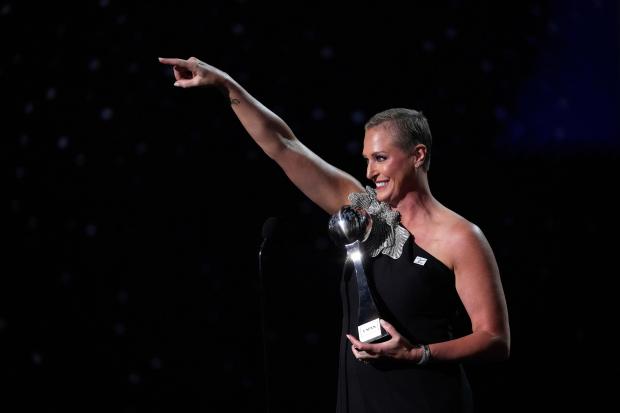 Penn State volleyball coach Katie Schumacher-Cawley accepts the Jimmy V Award for Perseverance at the ESPY Awards on July 16, 2025, in Los Angeles. (Mark J. Terrill/AP)
Penn State volleyball coach Katie Schumacher-Cawley accepts the Jimmy V Award for Perseverance at the ESPY Awards on July 16, 2025, in Los Angeles. (Mark J. Terrill/AP)
Her family also attended a Cubs game Aug. 2 to watch Schumacher-Cawley throw a ceremonial first pitch. It was a joy considering she grew up going to games as the niece of the late Frank Maloney, the longtime Cubs director of ticket operations.
“(The attention) is a little overwhelming, but I’m so grateful for the people that have rallied around not just me but the team itself,” Schumacher-Cawley said. “And just the love I felt has been great.”
Now, she’s gearing up to lead Penn State in its quest to defend its title, starting Saturday against No. 12 Creighton at the AVCA First Serve tournament.
The Nittany Lions were ranked No. 2 in the AVCA preseason poll behind Nebraska thanks to returners such as Starck and Grimes and offseason additions such as Kennedy Martin, an All-American transfer from Florida.
Schumacher-Cawley still will be juggling treatments and gym time this season.
She is undergoing a lighter dose of chemotherapy treatment every three weeks through January before she has reconstructive surgery. She has to sit for only about 45 minutes, as opposed to the 3½-hour treatments last season. She can do it in State College as opposed to Philadelphia. There are still physical effects, but she doesn’t expect to lose her hair.
“I get a little bit tired, but who isn’t tired?” Schumacher-Cawley said.
She wasn’t sugarcoating the difficulties she continues to face — just showing her determination to continue to show up for her players, as they did for her last season.
“There are really hard days, but a lot of people are battling, whether it’s cancer or another disease,” Schumacher-Cawley said. “I just wanted to stay focused on my group and help them as much as I could.”
